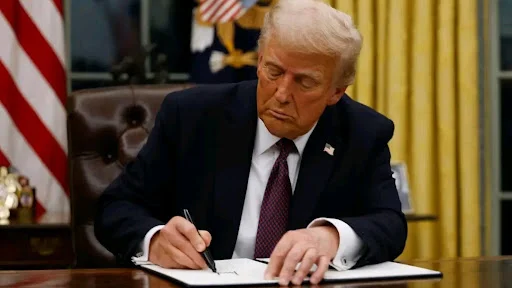By Mohammed Bello Doka
The global economy is once again on edge as U.S. President Donald Trump revives his aggressive trade policies, triggering retaliatory measures from key economic players. Mexico, Canada, and China have all responded with counter-tariffs, escalating tensions that threaten to destabilize markets, disrupt supply chains, and raise costs for consumers worldwide.
With protectionism back at the center of U.S. economic policy, experts warn that the consequences could be far-reaching, affecting industries, employment rates, and international relations. The question remains: Is Trump’s trade war a strategic move to boost American manufacturing, or is it a reckless gamble that could plunge the world into economic uncertainty?
Trump's Tariffs: A Repeat of History?
Trump's latest round of tariffs mirrors his first-term trade war with China, which saw billions of dollars in duties imposed on imports. This time, however, the scope has expanded. The former president has slapped a 25% tariff on Mexican and Canadian goods and a 10% tariff on Chinese imports, citing economic security concerns and a need to protect domestic industries.
While his administration claims these measures will bring jobs back to America, history suggests otherwise. The 2018–2019 U.S.-China trade war led to significant price increases for American consumers, forced businesses to shift supply chains, and resulted in retaliatory tariffs that hurt U.S. farmers and manufacturers. With another trade war looming, global markets are bracing for similar disruptions.
Mexico’s Counterattack: Impact On North American Trade
Mexico, the U.S.’s largest trading partner, has swiftly responded to Trump’s tariffs with its own set of retaliatory duties. Though specific details remain undisclosed, sources suggest Mexico will impose tariffs ranging from 5% to 20% on key U.S. exports, including pork, cheese, fresh produce, steel, and aluminum.
Given the deeply integrated nature of North American trade, Mexico’s response could have severe implications for American industries that rely on cross-border supply chains. The U.S. automotive sector, for instance, depends heavily on Mexican-made parts. Any disruption could lead to production delays and increased vehicle prices, directly impacting American consumers.
Mexican President Claudia Sheinbaum has made it clear that Mexico will not be bullied into submission. “Trade must be mutually beneficial. Unilateral policies that harm economic cooperation will not be tolerated,” she said in a statement.
Canada Joins The Trade Battle
Canada, another long-standing U.S. ally, has also hit back with counter-tariffs totaling $107 billion on American goods. The first phase of $30 billion takes effect immediately, while the remaining $77 billion will be implemented over the next few weeks. Among the affected products are U.S.-made beer, wine, bourbon, fruits, clothing, and household appliances.
Prime Minister Justin Trudeau has openly condemned Trump’s tariffs, warning that they could inflict long-term damage on North American economic relations. “These protectionist policies are short-sighted and harmful. Instead of fostering growth, they risk economic instability,” Trudeau said in an address to the Canadian Parliament.
Canada’s response highlights growing frustration among U.S. allies, who have repeatedly criticized Trump’s go-it-alone approach to trade. With both Mexico and Canada taking decisive action, North America’s economic ties face a new era of uncertainty.
China’s Response: The Global Heavyweight Enters The Fray
China, the world’s second-largest economy, has also responded forcefully. The Chinese government has vowed to challenge the U.S. tariffs at the World Trade Organization (WTO) while implementing countermeasures of its own.
Unlike Mexico and Canada, China’s retaliation could target a broad range of U.S. sectors, including agriculture, technology, and manufacturing. If Beijing imposes tariffs on American soybeans, aircraft, or semiconductors, it could severely impact U.S. exporters, many of whom rely on Chinese markets for revenue.
Adding to the tension is Trump’s claim that the tariffs on China are meant to pressure Beijing into stopping the flow of fentanyl into the U.S. China has rejected this justification, calling it a baseless accusation. “The fentanyl crisis is an American issue, not a Chinese one. The U.S. should focus on its domestic policies rather than blaming external forces,” a spokesperson for China’s Ministry of Commerce stated.
Broader Implications For The Global Economy
The ripple effects of this escalating trade war are already being felt. Global stock markets have reacted negatively, with investors fearing the return of trade instability. Companies that rely on international supply chains are scrambling to reassess their strategies, while economists warn that prolonged tariff battles could slow global economic growth.
The International Monetary Fund (IMF) has previously estimated that trade wars reduce global GDP growth by at least 0.5%, with emerging markets being the hardest hit. Developing economies that rely on exports to the U.S., China, or North America may face declining demand, weakening currencies, and financial instability.
For American businesses, the consequences could be even more immediate. Increased tariffs mean higher production costs, which are likely to be passed on to consumers in the form of rising prices. If history repeats itself, American farmers, manufacturers, and retailers could suffer losses, as retaliatory tariffs make U.S. goods less competitive in foreign markets.
Political Considerations: Trade War As A Campaign Strategy?
Beyond economics, Trump's latest trade war is widely seen as a political maneuver aimed at energizing his base ahead of the 2028 elections. His protectionist stance has always resonated with voters who believe foreign trade agreements have undermined U.S. jobs. However, the backlash from U.S. businesses and allies suggests that this strategy could backfire.
With global trade relations deteriorating and markets bracing for uncertainty, Trump's approach is once again under scrutiny. Will his aggressive trade policies lead to economic resurgence, or will they plunge the world into another recession? As tensions mount, the answer may unfold in the coming months, with consequences that will be felt across borders and industries worldwide.
Tags
International

